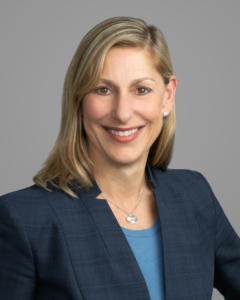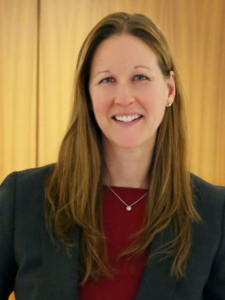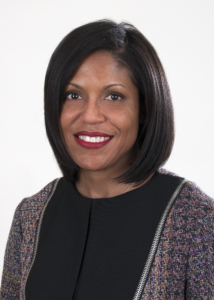When she was first starting out, Katten’s Julie Gottshall would not have predicted she would spend nearly her entire legal career working for a single large law firm. In a profession with many options, and an era that often rewards job changes, Gottshall believed she would join different employers and maybe even take some time off the career fast track. Instead, Gottshall found a position that enabled her to grow and balance, and decided to stick with it.
Sometimes, says Gottshall, the best opportunity is the one you already have.
Finding Her Niche
Gottshall’s career has been a steady climb. After graduating from George Washington University Law School, she decided that moving to Chicago would be her “great life adventure,” despite the fact that she had no obvious connection to the city. She initially eschewed the largest law firms, choosing to start her legal career at a midsize firm that she hoped would provide a more appealing lifestyle. But when she was a fourth-year associate, two partners with whom she worked closely joined Katten. She moved with them to continue her career focus on employment counseling and litigation, a practice she has solidly established and now leads.
Gottshall felt drawn to employment law for the human element of the practice, and the opportunity to keep her corporate clients out of trouble but defend them if they nonetheless found themselves facing a lawsuit. At Katten, Gottshall handles a broad spectrum of employment issues, including worker mobility (e.g., non-compete implementation and enforcement); employee separations and reductions in force; worker classification and wage/ hour compliance; handbook and policy implementation; workplace investigations; and discrimination and harassment prevention. She has litigated in numerous state and federal courts at both the trial and appellate level, and before all manner of government agencies. She also acts as an impartial third-party arbitrator on the Employment Panel of the American Arbitration Association, where she has decided cases involving breach of contract; discrimination, retaliation and harassment issues; and other workplace matters.
Gottshall likes to quip that one of her most impressive professional achievements is to fly deftly under the radar, since she works hard to keep her clients on track and out of the spotlight. Always one to look for practical solutions, she describes herself as a counselor first, an attorney second, and a litigator last. Still, she knows her way around a courtroom. She is particularly proud of a whistleblower case she argued and won before the Illinois Supreme Court – a victory that was the culmination of 11 years of work. After she prevailed in the lower court only to see the decision overturned on appeal, she sought certiorari, becoming one of seven out of 237 petitions the Illinois Supreme Court agreed to hear that session. The high court ruled unanimously in her client’s favor, marking a noteworthy victory for her client and a favorable precedent for other employers.
Gottshall finds employment law is a particularly exciting space right now, given the current remote work environment during the pandemic that has prompted employers to reimagine the workplace and what it will look like in both the near and distant future, as well as presented challenges regarding workplace safety, sick leave and furloughs and layoffs.
Mastering the Balancing Act
While the legal field continues to evolve in its support for personal life choices, Gottshall finds that women still face a constant challenge in finding the right balance. “We are called upon to take on so many roles— some that we need to do and some that we want to do,” says Gottshall. “It’s up to each person to decide how to allocate her time and navigate how much is spent on family and other pursuits, versus how much is poured into a career.”
Still, Gottshall has found Katten conducive to personal as well as professional growth. As she notes, a long tenure at a single firm allows you to build credibility and good will. Your colleagues know your work ethic and contributions, which better positions you to set boundaries and request flexibility. She encourages the use of maternity and paternity leave and other options such as Katten’s sabbatical program, designed to help promote work-life balance. “I applaud women who lean in, but also take advantage of the programs offered, especially today as companies realize they have to adapt to keep their top performers,” Gottshall said. Like most women, Gottshall tries to multi-task when she can. In fact, she once leveraged her maternity leave to take a mediation course to further her career. “Women should determine the best course for them, their families and careers.”
Gottshall appreciates opportunities like the Katten Women’s Leadership Forum that can support women attorneys’ desire to create bonds with other women and fulfill the responsibility to be a mentor.
Part of her balance also comes from using her skills in her community. For example, she has been a school board member for eight years, which she sees as an important commitment. “It’s a gratifying way to leverage my professional knowledge while giving back,” she says.
With one daughter in college and another in her senior year of high school, Gottshall and her husband are looking forward to determining what it means to be “empty nesters.” For now, they enjoy paddle sports and indulge in their passion for travel, especially visiting national parks.
“You have to be mindful of your priorities,” she said, “and look for the joy in everyday pursuits so you don’t lose sight of perspective in all the things life offers you.”



 By Nicki Gilmour
By Nicki Gilmour
